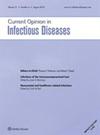先天性免疫错误与侵袭性真菌感染:表现与处理。
IF 3.6
3区 医学
Q2 INFECTIOUS DISEASES
引用次数: 0
摘要
综述目的我们综述了部分先天性免疫错误患者侵袭性真菌感染的临床表现。此外,我们还回顾了其治疗的特殊性,包括抗真菌治疗、预防性治疗和免疫调节治疗。所有慢性肉芽肿疾病患者、STAT3 缺乏症患者以及患有潜在肺实质疾病的患者都应进行霉菌活性抗真菌预防。STAT1 功能增益突变患者很少发生侵袭性真菌感染,而 Caspase-associated recruitment domain-containing protein 9 缺乏症的临床表型则包括各种浅表性和侵袭性真菌感染。大多数先天性免疫错误和侵袭性真菌感染患者需要长期服用抗真菌药物。慢性肉芽肿病患者应及早考虑造血干细胞移植,但其他先天性免疫缺陷并伴有活动性侵袭性真菌感染的患者则结果不一。对这些患者真菌感染的治疗通常具有挑战性,需要结合抗菌药预防、抗真菌治疗和免疫调节。本文章由计算机程序翻译,如有差异,请以英文原文为准。
Inborn errors of immunity and invasive fungal infections: presentation and management.
PURPOSE OF REVIEW
We review the clinical presentations of invasive fungal infections in a selection of inborn errors of immunity. In addition, we review the particularities of their management, including antifungal therapy, prophylaxis, and immunomodulatory treatments.
RECENT FINDINGS
Patients with chronic granulomatous disease and with signal transducer and activator of transcription 3 (STAT3) deficiency are particularly prone to aspergillosis. Mold-active antifungal prophylaxis should be prescribed to all patients with chronic granulomatous disease, and in patients with STAT3 deficiency and underlying parenchymal lung disease. Invasive fungal infections are rare in patients with STAT1 gain-of-function mutations, while the clinical phenotype of caspase-associated recruitment domain-containing protein 9 deficiency encompasses a wide range of superficial and invasive fungal infections. Most patients with inborn errors of immunity and invasive fungal infections require prolonged durations of antifungals. Hematopoietic stem cell transplantation should be considered early for patients with chronic granulomatous disease, but results have been more mixed for other inborn errors of immunity with active invasive fungal infections.
SUMMARY
Inborn errors of immunity can confer increased susceptibility to a variety of invasive fungal infections, which can present with specific clinical and radiological features. Management of fungal infections in these patients is often challenging, and relies on a combination of antimicrobial prophylaxis, antifungal treatments, and immunomodulation.
求助全文
通过发布文献求助,成功后即可免费获取论文全文。
去求助
来源期刊
CiteScore
6.70
自引率
2.60%
发文量
121
审稿时长
6-12 weeks
期刊介绍:
This reader-friendly, bimonthly resource provides a powerful, broad-based perspective on the most important advances from throughout the world literature. Featuring renowned guest editors and focusing exclusively on two topics, every issue of Current Opinion in Infectious Disease delivers unvarnished, expert assessments of developments from the previous year. Insightful editorials and on-the-mark invited reviews cover key subjects such as HIV infection and AIDS; skin and soft tissue infections; respiratory infections; paediatric and neonatal infections; gastrointestinal infections; tropical and travel-associated diseases; and antimicrobial agents.

 求助内容:
求助内容: 应助结果提醒方式:
应助结果提醒方式:


